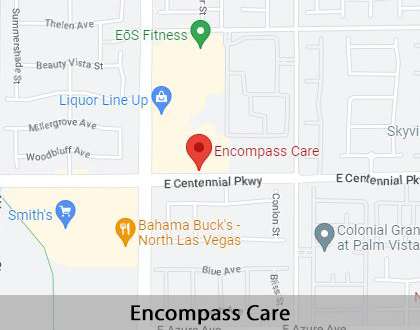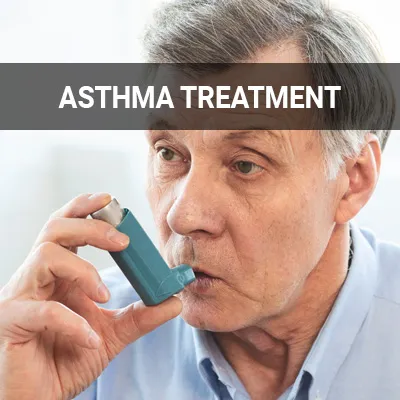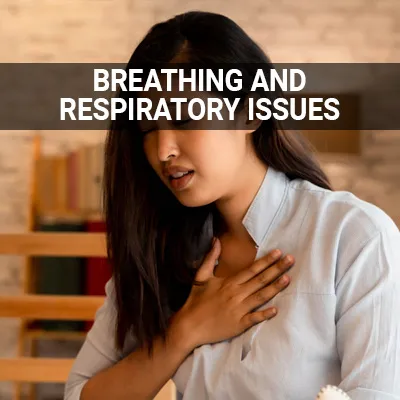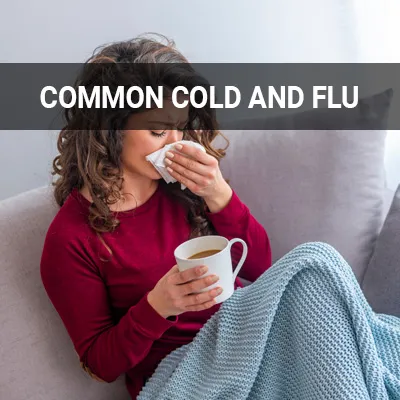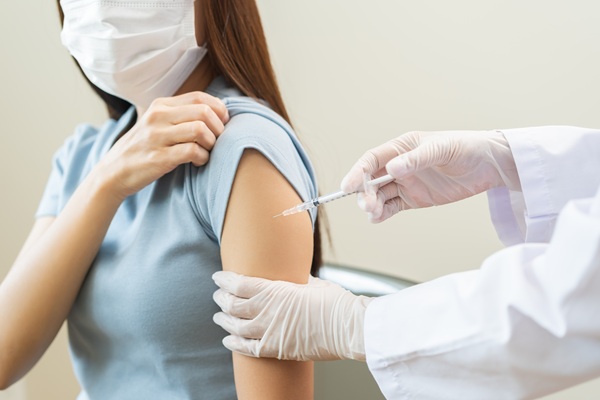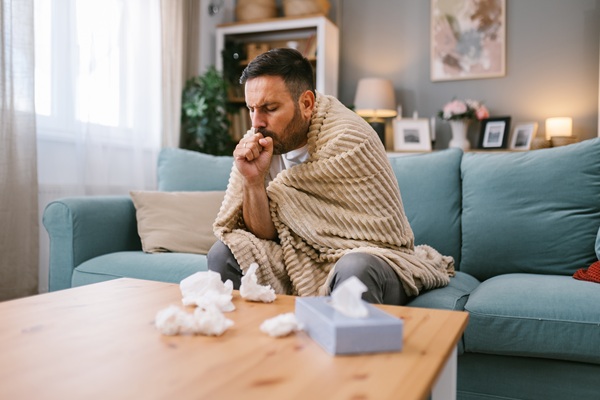Allergy Treatment North Las Vegas, NV
Allergic reactions can be frightening for you or your loved ones, especially if you have never had the unpleasant experience of going through them before. They can cause a variety of symptoms, ranging from minor annoyances to life-threatening situations. Due to this wide-ranging spectrum of allergic reactions, many evaluations and treatments may be necessary.
Allergy treatment is available at Encompass Care in North Las Vegas and the surrounding area. You deserve to live a life without fear of allergy attacks. We may be able to help. Call us today at (702) 514-4295 to schedule an appointment or to learn more about our services.

Different Types of Allergies
Allergies occur when the body comes into contact with any foreign substance the immune system identifies as harmful. During an allergy attack, the immune system produces antibodies to protect itself from the trigger. There are four main types of allergies: (1) seasonal allergies, (2) food allergies, (3) drug allergies, and (4) insect sting allergies.
Seasonal allergy is the type of allergy that corresponds with a particular season, typically spring or winter. It is associated with an increase of pollen in the air. Symptoms usually include sneezing/coughing, congestion, watery eyes, and itchiness. Food allergy is the type of allergic response that occurs after eating a specific food or drink.
Drug allergy is when the immune system is sensitive to a specific medication and can cause nausea, difficulty breathing, and dizziness. Insect sting allergy is an allergy to venom from bees and other insects. Symptoms are severe, involving swelling, difficulty breathing, and itchiness.
“Allergies occur when the body comes into contact with any foreign substance the immune system identifies as harmful.”
How Allergic Reactions Feel
Allergic reactions may manifest within minutes or hours, possibly involving extreme itching and swelling of the face, tongue, throat, and other body parts. It is not uncommon for allergy attacks to exacerbate asthma or negatively affect the gastrointestinal system. These symptoms can include nausea, stomach pain, stomach cramping, vomiting, or diarrhea.
The most severe reaction is called "anaphylaxis," a combination of symptoms, including wheezing/gasping, hives, swelling, and stomach problems. This constellation of symptoms can have an extreme effect on your body that can lead to dangerously low blood pressure, heart problems, and death. There is even a particular type of anaphylaxis that only happens after exercise or hard work several hours after exposure to the trigger.
“Allergic reactions may manifest within minutes or hours, possibly involving extreme itching and swelling of the face, tongue, throat, and other body parts.”
What Urgent Care Physicians Can Do for Allergic Reactions
The main priority for an urgent care physician treating a patient with an allergy attack is to determine whether they are in any immediate danger. Typically, this means the physician will focus on the patient's airway and ability to breathe, making sure to look out for the characteristic swelling seen in vital areas like the lips, tongue, and throat. They will also look for any skin symptoms like itchiness, redness, or swelling.
If the patient's life is not in danger, the physician will ensure their safety before continuing to probe for the triggering substance. This may involve drawing blood to run any necessary labs and asking the patient detailed questions about the 24 hours preceding the symptoms, especially the one to two hours immediately before. Patients should take special care to disclose any:
- Exposures. Any substance that the patient could have eaten, injected, or somehow might have come into contact with.
- Timing. The period between the substance and the beginning of your symptoms.
- Physical Activity and Environment. Extreme temperatures and physical activity may trigger anaphylaxis.
For optimal treatment, patients should be as forthcoming as possible about any potentially relevant information. This will allow the physician to make the most accurate possible diagnosis while also maximizing the patient's chances of a speedy recovery.
“The main priority for an urgent care physician treating a patient with an allergy attack is to determine whether they are in any immediate danger.”
Check out what others are saying about our services on Yelp: Allergy Treatment in North Las Vegas, NV
How Urgent Care Physicians Can Treat Allergic Reactions
Suppose it is an emergency, and the patient's case is determined to have a severe allergic reaction. In that case, the urgent care physician will administer epinephrine, the same medicine used in "Epi-pens." Furthermore, the physician may administer some oxygen through a breathing mask. They will also likely receive an IV for quick access to medications and fluids.
If the allergic reaction is less severe, the physician will treat the patient with a variety of medications specific to their symptoms. A prescribed topical cream or ointment may be able to take care of itchiness. Other symptoms that cannot be treated topically may require an oral or IV medication.
After the patient's condition has stabilized and any less severe symptoms have been relieved, the physician will likely refer them to an allergist. There, the patient can obtain more specialized testing to understand what triggered their allergic reaction.
“For optimal treatment, patients should be as forthcoming as possible about any potentially relevant information.”
Questions Answered on This Page
Q. What are the different types of allergies?
Q. What can an urgent care physician do for me if I have an allergic reaction?
Q. How will an urgent care physician treat my allergic reaction?
People Also Ask
Q. What are some of the common triggers of asthma?
Q. What can professional treatment do for my respiratory issues?
Q. What are the most common causes of respiratory issues?
Frequently Asked Questions
Q. Can you outgrow allergies?
A. It is possible to outgrow allergies, especially for children. Immunotherapy is also an option for those who want to try a form of exposure therapy. Though immunotherapy will not cure the allergy, it may alleviate future symptoms.
Q. Do I have allergies or a cold?
A. Seasonal allergies often share many symptoms with the common cold: congestion, fatigue, headache, runny nose, sneezing, and watery eyes. In allergies, these symptoms manifest all at once. Additionally, cold symptoms will typically last up to 10 days, whereas allergy symptoms will remain until the patient has been removed from the allergen.
Q. Is stress linked to allergies?
A. Yes. Though not a causal factor, stress can exacerbate any allergic reactions by increasing histamine levels in the bloodstream. Allergy symptoms may multiply as a result.
Q. Who develops allergies?
A. Anyone can have allergies. They are more common in children, but they can still manifest at any age. It is not uncommon for allergies to recur after years of remission.
Q. How common are allergies?
A. Allergies are widespread across the United States. An estimated 20% of Americans, or 40 to 50 million Americans, have allergies. This makes it the fifth-most common chronic disease in the country.
Start Feeling Better – Visit Us Today
By visiting us as soon as possible, our team can help get you the professional treatment you need. Instead of waiting around and allowing the symptoms to get worse, we can provide you with stronger medication and treatment options instead of ineffective store-bought products.
Definitions
Come In Today
Allergic reactions can be deadly if not treated right away. We at Encompass Care may be able to help. Call us today at 702-514-4295 to make an appointment or to learn more about our services. We also accept walk-ins.
Helpful Related Links
- American Journal of Medicine. American Journal of Medicine. 2023
- American Medical Association (AMA). American Medical Association (AMA). 2023
- American Medical Society For Sports Medicine (AMSSM). American Medical Society For Sports Medicine. 2023
- American Trauma Society. American Trauma Society. 2023
- John Hopkins Medicine Orthopaedic Surgery. John Hopkins Medicine Orthopaedic Surgery. 2023
- National Council on Aging. National Council on Aging. 2023
- Orthopaedic Surgery: Association of American Medical Colleges. Orthopaedic Surgery: Association of American Medical Colleges. 2023
- Radiological Society of North America. Radiological Society of North America. 2023
About our business, license, and website security
- Encompass Care was established in 1997.
- We accept the following payment methods: American Express, Cash, Discover, MasterCard, and Visa
- We serve patients from the following counties: Clark County
- We serve patients from the following cities: Las Vegas, North Las Vegas, Henderson, Paradise, Spring Valley, Boulder City, and Winchester
- Norton Safe Web. View Details
- Trend Micro Site Safety Center. View Details
Back to top of Allergy Treatment

